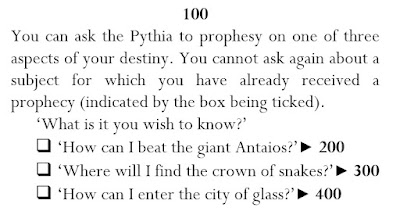“To understand the Athenians properly, we must recognise that it isn’t just that they perceived the world differently, but that the world itself was different. […] That we tend to see [objective reality] as a ‘natural’ feature of the world and not as our own construct is inherently bound up with the development of colonial modernity in the West. On these grounds, histories of pre-modern cultures that make use of modern Western ontologies fail to capture something essential about the world as it was. Shackled to our own ways of understanding, we can only ever write what amounts to a shadowy prehistory of ourselves.”
* * *
That's from Claire Hall's article "The Day A God Rode In" in The London Review of Books. If you want to read the whole thing, I'll wait.
So should a historical Spartan RPG include divine favour? I'm not talking about a fantasy setting here, but one where you’re trying to recreate Classical Greece as it really was. Clearly that was a world governed by the same physical laws as ours. The Greek gods don’t exist now and they didn’t then. The cosmos didn’t care whether this or that Greek hero lived or died.
Yet if the rules reflect that, the players will think like 21st century characters, not like Greeks of the 5th century BC. So maybe you need to include things like POW (in RuneQuest terms) to fix that. I'm thinking about it because at some point I mean to finish my Sparta roleplaying sourcebook Λ and Basic Roleplaying seems like a good set of rules to use for that.
But what do you think? Can we ever achieve objective reality in a historical setting? Or must we make game rules that fit the worldview of the people who lived there?














